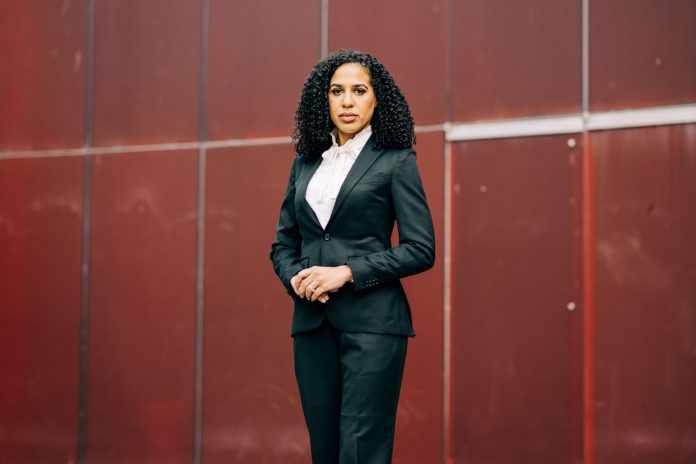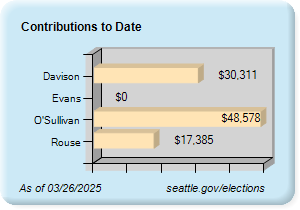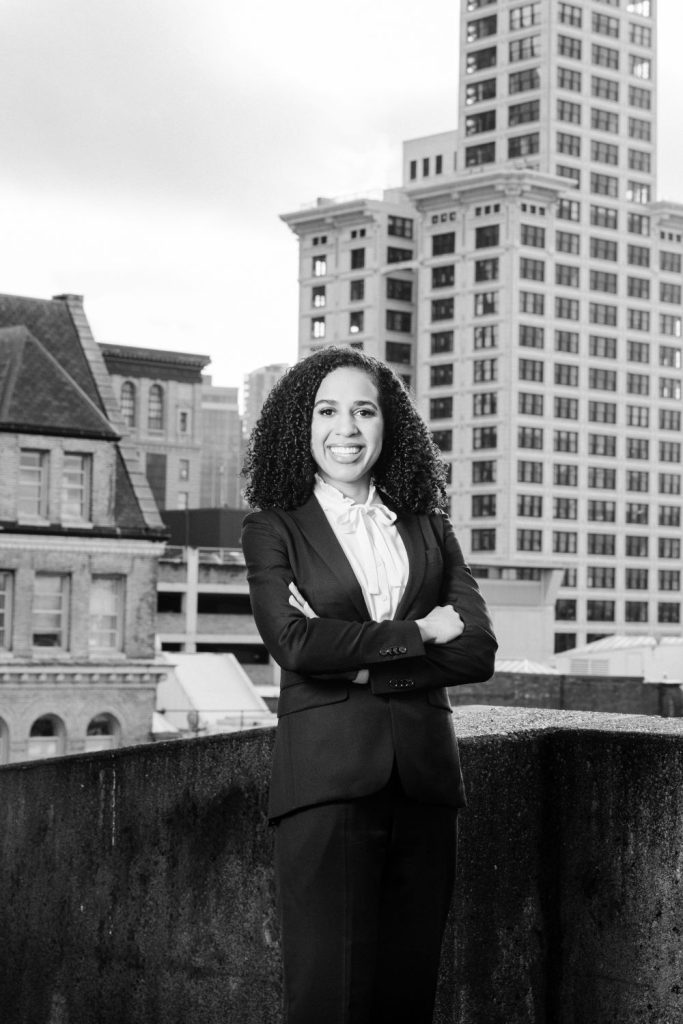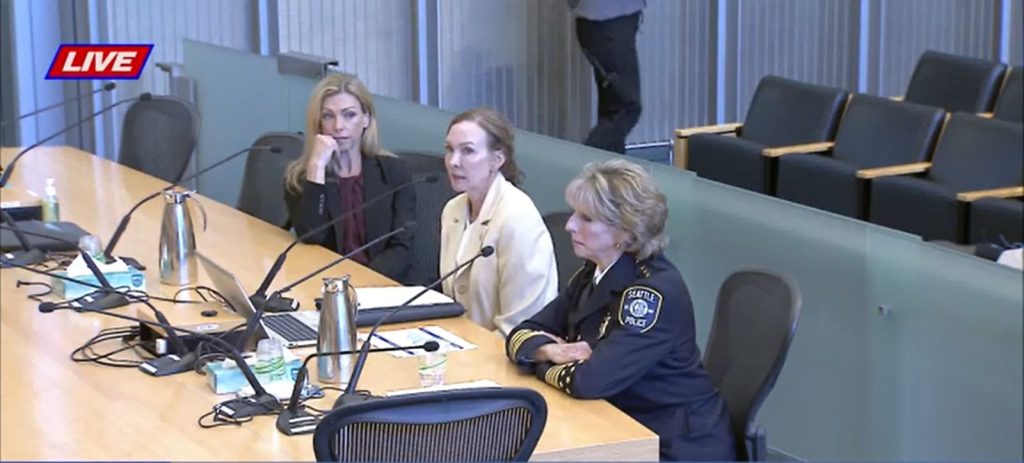
Prosecutor Erika Evans entered the Seattle City Attorney’s race this month, joining an increasingly crowded field of candidates eager to challenge incumbent Ann Davison. Evans presents herself as a well-balanced candidate with plenty of prosecutorial experience, community leadership bona fides, and the lived experience that would allow her to lead the City Attorney’s Office with a dual focus on empathy and accountability.
Evans recently resigned her position as an assistant US Attorney at the Department of Justice (DoJ). Between the slew of executive orders from President Donald Trump, being told the DoJ were now Trump’s lawyers, and the insistence of US Attorney General Pam Bondi that her interpretation of the law is now how all DoJ lawyers must interpret it, Evans said she knew she needed to step into something else.
“It brought me back to why I became an attorney,” Evans said. “It was to represent and serve my community.”
Evans decided she could best serve her community at this moment by running for Seattle City Attorney.
“I’m the only candidate in this race with line-level prosecutorial experience, including the Republican incumbent, at both the city and federal levels,” Evans said. “I think this background makes me uniquely equipped to navigate federal and local laws and address public safety priorities and fight for justice in our communities.”
Davison now has three challengers to her left. Evans joins legal aid attorney Rory O’Sullivan and public defender Nathan Rouse to vie for the position.
All four candidates have indicated they intend to participate in Seattle’s Democracy Voucher program. Thus far only two candidates have completed the qualifying process and appear as eligible on the City’s voucher website: first O’Sullivan, followed by Rouse.

Rouse’s campaign announced in mid-March that they have collected 1,368 vouchers at that time, which they say is the most vouchers collected of any candidate challenging an incumbent in Seattle this cycle. However, the O’Sullivan campaign contends they are ahead, pointing to data from the Seattle Ethics and Elections Commission website.
Evans’ critique of Ann Davison’s tenure as City Attorney
Evans was vocal in her critique of many of Davison’s controversial “tough on crime” policies, citing Davison’s lack of experience as a factor.
Billed as a fix for chronic shoplifters and other repeat misdemeanors, Davison’s High Utilizers Initiative cycles a small group of people, many with behavioral health issues, in and out of Seattle’s courts and jails. Evans doesn’t think the policy is working, especially given that the maximum amount of time a person can spend in jail for a misdemeanor is a year.
“Just locking those folks up without any resources or treatment or doing a holistic approach to addressing underlying problems, that’s not how you solve it. But with what the Republican City Attorney is doing, she’s not doing it right,” Evans said. “There’s a smart approach to addressing folks that we know are having underlying issues, and it’s with treatment and services, and that addresses the underlying root cause.”
Davison has recently admitted that her Stay Out of Drug Area (SODA) and Stay Out of Area of Prostitution (SOAP) zones have not been effectively enforced, with only three SODA orders and one pending request for a SOAP order since the legislation’s passage last year.
Evans called the SODA and SOAP zones “ridiculous” and “not effective.” “We know the historical data on them — that they disproportionately affect Brown and Black folks,” Evans said.
Instead, Evans thinks the City Attorney’s Office should be working more with its federal partners and local federal prosecutors to pursue high-level traffickers. “Back to understanding the role of City Attorney, this is a misdemeanor court, and so I think there might be a misconception with the Republican City Attorney on what the role is,” Evans said.
Evans said that, were she to become City Attorney, she would not be sending anyone to the SCORE jail in Des Moines, where 10 people have now died in the last two years. When it comes to the King County Jail, Evans emphasized that jail is not a good substitute for a treatment facility.
“At the misdemeanor level, if it’s coming to underlying issues of needing treatment or needing housing or resources, [jail] is not the place to rehabilitate and help folks,” Evans said.

Evans agrees with criticism from fellow opponents Rouse and O’Sullivan over Davison’s handling of domestic violence and drunk driving (DUI) cases. Evans said when Pete Holmes was the City Attorney, domestic violence cases took an average of 25 days to file, whereas now, under Davison, that number has doubled. Like O’Sullivan and Rouse, Evans pointed out that DUI cases don’t require a toxicology lab report to prosecute, Davison’s excuse for the office’s backload of those cases.
“There’s a way to go forward on those cases, and I think it just comes with a lack of our Republican City Attorney’s experience,” Evans said. “This is how we’re going to go forward and make sure crimes that are seriously putting public safety at risk are being handled and addressed.”
Davison’s team filed a blanket affidavit against elected Judge Pooja Vaddadi for all criminal cases, a move Evans characterized as “wild.” Other mechanisms exist when a prosecutor is concerned about a judge’s rulings that Evans thinks are more appropriate to use.
“It’s costing taxpayers more money to have other judges come in and paying a whole nother salary,” Evans said. “And it’s also affecting public safety, because not having all the judges to handle the DV and DUI, what does that mean? Then it means that those cases are taking longer.”
Evans doesn’t agree with Davison’s decision to write an amicus brief in the Grants Pass case, saying it’s against the values of Seattle to not offer shelter before removing homeless encampments. And Evans objects strongly to Davison’s belated decisions around joining lawsuits against Trump’s administration.
“I think there was obvious hesitancy for the Republican City Attorney to even get involved in the first place. And that is really sad, because there’s people here in our city that are absolutely afraid right now,” Evans said.
Evans’ background and experience
Evans began her legal career at the Seattle City Attorney’s Office under Holmes. She worked as a line-level trial rotation prosecutor, handling DUI, assault, and other misdemeanor cases. She was then promoted to the civil side of the office, working to defend the City from lawsuits. At the same time, she worked as a pro tem judge presiding at other city-level courts in Seatac, Puyallup, and Tukwila.
In 2021, Evans went to work as an assistant US Attorney, where most recently she worked as a civil rights coordinator. She was responsible for investigating and prosecuting hate crimes in Western Washington as well as holding police officers accountable for issues such as excessive use of force. She also worked in the violent crimes and terrorism unit.
Evans touts her boots on the ground experience, saying, “I’ve definitely been responsible for getting hundreds of thousands of fentanyl pills off the streets, like high level drug traffickers and gun traffickers, with getting automated weapons and machine guns off the streets.”
Her community leadership experience includes serving as the president of the Loren Miller Bar Association, a civil rights organization dedicated to the success of the Black legal community. Before law school, she volunteered at legal aid clinics to help people who can’t afford an attorney. She led a bar pass program for diverse law graduates leading up to their bar examinations and was a previous co-chair of the Charles V. Johnson youth in law forum, which provided education to youth for knowing their rights and learning how to find opportunities in the legal field.
Most recently, she has been leading the Washington Leadership Institute, which works to accelerate young attorneys, typically from underserved backgrounds such as Black and Brown communities and LGBTQ+ communities, into leadership roles in Washington state.
Evans grew up in a Black working class, low-income household in Tacoma. She spoke about her family being deeply rooted in civil rights activism. She’s had loved ones deal with substance use disorder, and in 2017 her apartment building in Eastlake was shot up by police officers.
“I think when we have those diverse lenses in life experiences, that makes government better,” Evans said.
A new vision for community court
Evans laid out three priorities she would bring to the City Attorney’s office: public safety, a restorative justice model, and fighting back against the Trump administration.
Evans is passionate about the idea of bringing a new, reimagined community court back to Seattle. She envisions something that isn’t located in an actual courtroom but instead is embedded within the local community, with a dedicated judge, prosecutor, and defense attorney. She referenced the community court in Auburn, Washington, which has many of the resources that would be needed by defendants at community court available at the same location, including medical treatment, help finding housing and getting inpatient treatment, and a fostering program for people’s pets. She says the Auburn community court has a very low recidivism rate.
“We need to have services available for folks to be successful,” Evans said. “And that is absolutely the model that I would bring of reimagining [community court] in a way that works and as holistic wraparound services for folks to be successful.”
She said some of the services offered by such a court could be paid for with federal grants and partnerships with federally funded nonprofits. However, given the current uncertainty surrounding federal funding, it’s possible another funding source would need to be identified.
Evans would also like to see precinct liaison attorneys embedded into police precincts who are able to interact with both officers and community, providing training to prevent harms and pro-actively attempt to reduce claims against the City.
Evans wants to hire more attorneys to staff units working to protect labor rights and tenant rights and prosecute wage theft. “That is work I will be a champion of, and we will beef up those units 100%,” Evans said. “And I think, just my lived experiences too, coming from a family that are involved in unions and being on the working class, low income side, we got to stand up for our folks.”
When it comes to the Seattle Police Officers Guild (SPOG) contract, the latest version of which disappointed police accountability advocates last year when it provided officers with 24% raises while not making many accountability gains, Evans says she’ll be a champion of the ongoing negotiations being in line with accountability and laws. Evans says she’ll also be an advocate at the state legislature for state law that would allow the Community Assisted Response & Engagement (CARE) team to expand and operate according to best practice. She brought up House Bill 1816, which did not receive a House floor vote before the cut-off date, but would have smoothed the path to a CARE expansion, circumventing police guild resistance.

Evans thinks even after Seattle exits the consent decree, it will be important to continue paying attention to accountability and holding true to the requirements of the decree, including making sure the Seattle Police Department is not engaging in biased policing.
After two months of a stream of partisan and illegal executive orders coming from Trump’s office, Evans stressed the importance of actively protecting Seattle’s residents.
“As City Attorney, I will absolutely fight back against Trump,” Evans said. “And as City Attorney I will ensure that our office stands against these attempts to erase progress and undermine our Seattle values of having this equity lens.”
Evans stressed the importance of challenging environmental rollbacks, Trump’s diversity, equity, and inclusion (DEI) ban, and his executive orders around reproductive rights and gender-affirming care.
“I know that I will use every legal tool and experience I have to fight against these unconstitutional federal policies that harm and threaten our city,” Evans said.
Potential for a close race
With new headlines every day about Trump gutting civil rights, playing trade war games with former allies, pulling federal funding, and hamstringing government institutions, incumbent Davison is definitely on the defensive in blue Seattle. While Davison now claims to be an independent, her history as a Republican convert in 2020 and participant in the Walk Away movement (which sought to recruit Democratic voters to back Trump) is well known, as her opponents are not shy about pointing out.
All three of her opponents are united in their criticisms of her policies and her muted reaction to even Trump’s most egregious executive orders. All three espouse the importance of addressing root causes of low-level crime and disorder, which constitute most misdemeanors dealt with by the City Attorney’s Office, while being more efficient about prosecuting the more serious crimes of domestic violence and DUIs. And all three want to see the office become more of a force for good when it comes to protecting workers’ and renters’ rights.
Where the three challengers most differ, then, is in their experience.
O’Sullivan has spent his professional career in legal aid, poverty law, and most recently, in helping workers seeking unemployment benefits. Rouse started out clerking for federal judges and working for two large law firms, before leaving that behind to become a public defender helping people who cannot afford legal representation. Evans has spent her professional career as a prosecutor, first at the office she’s now running to lead and later at the federal level.
If she prevails, Evans would be the first Black Seattle City Attorney in a country where only 5% of lawyers are Black.
“I knew what we need right now in the City Attorney’s Office is someone that understands the federal system, that’s worked in it, that knows how to fight back against Trump, someone that’s worked in that [City Attorney’s] office,” Evans said. “Everything that I’ve done in my life has actually prepared me for this moment.”
Update: The Seattle Ethics and Elections Commission finished qualifying the Rouse campaign to redeem democracy vouchers around the same time this went to post. We updated at 9am Friday to note that they are now qualified.
Amy Sundberg is the publisher of Notes from the Emerald City, a weekly newsletter on Seattle politics and policy with a particular focus on public safety, police accountability, and the criminal legal system. She also writes science fiction, fantasy, and horror novels. She is particularly fond of Seattle’s parks, where she can often be found walking her little dog.


